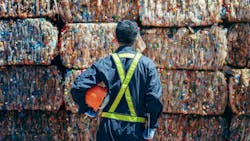Regulatory Confusion Threatens Advanced Plastics Recycling Growth
WASHINGTON, D.C. – Industry leaders speaking at the GlobalChem conference April 16 wrapped up the final day of the three-day event with a warning that advanced plastics recycling in the United States has an uncertain future without clear regulatory guidelines.
A significant challenge facing plastics recycling companies is the way regulatory bodies classify the process, alongside worries about contaminants in pyrolysis oil. The inconsistencies between federal and state interpretations of advanced recycling techniques could have a “chilling effect” on future investments, said Mark Duvall, a chemical industry attorney with Beveridge & Diamond.
The Trump administration will likely reinstate its previous position that converting plastic waste into pyrolysis oil is not a form of incineration, Duvall said. This distinction has become a significant point of contention in both domestic regulations and international negotiations on a global plastics treaty. Many NGOs and nations argue that pyrolysis and similar processes should be classified as forms of incineration due to their environmental impacts.
Beyond Plastics, an organization focused on eliminating single-use plastics like water bottles and plastic bags, states on its website that advanced recycling uses high heat to turn plastic into minimal amounts of fuel. In September, the California attorney general’s office filed a lawsuit against ExxonMobil, claiming the company has misled the public about the benefits of its plastics recycling efforts. ExxonMobil later countered with a defamation lawsuit against California Attorney General Rob Bonta.
Adding to the confusion are inconsistencies among state rulings. Some states consider pyrolysis processing to be a solid waste, making it subject to various disposal requirements, Duvall explained. About 25 states have ruled in favor of the advanced recycling industry and consider pyrolysis to be a form of manufacturing, he said.
Melanie Bower, regulatory development manager for circular products at ExxonMobil, said the industry needs to educate the public on the process and what it actually involves. She mentioned that ExxonMobil has invited the Environmental Protection Agency to visit its Baytown, Texas, facility where the company started its first advanced recycling unit in 2022.
“One of the myths that is out in society today about advanced recycling and pyrolysis in general is that we are burning plastic, and that is just the furthest thing from the truth,” she said.
Instead, the technology, which ExxonMobil calls Exxtend, uses heat to convert plastic molecules into smaller gas and liquid molecules that can then be turned into new products, she said.
Jeff Gold, founder and chief technology officer for plastics recycler Nexus Circular, described pyrolysis production as a closed-loop process that does not emit any pollutants because all waste streams are captured.
The company receives material in bale form and heats it down in reactors until it reaches the consistency of water. The resulting liquid is a honey-colored oil that the company ships to large petrochemical partners like Braskem, Shell and LyondellBasell, he said.
Gold echoed Bower’s statement that the industry needs to conduct more outreach with the public to overcome misperceptions.
Some critics of advanced recycling have also questioned the mass-balance certification approach, which allows recyclers to co-process plastics with fossil fuels.
Bower, in a follow-up conversation with Chemical Processing, likened mass balance to renewable energy systems, noting that when solar power enters the electrical grid, the resulting energy supply isn’t 100% renewable-based.
In addition to regulatory challenges, Bower said recycling rates in the U.S. need to increase along with standards for collection.
“People need access to recycling,” she said. “They need to know how to recycle.”
She added that more than 9,000 recycling systems exist in the U.S., and they all accept different types of materials and use different processes for sorting them.
“Standardization across the board would help in terms of knowing where we can send materials, where we can get materials,” she said.
Industry Lawyer: Don’t Get Complacent
In a prior session on plastics, another chemical sector attorney advised plastics recyclers to maintain their environmental safety protocols despite the Trump administration's elimination of EPA environmental justice programs.
“The federal government is not the sole arbiter of what is ESG policy,” said Brittany Bolen, a former administrator for the EPA’s Office of Policy and partner with Sidley Austin LLP.
The EU still has corporate reporting standards that producers must comply with, she said. In addition, manufacturers also are open to lawsuits from private parties.
“We are seeing a rise in greenwashing litigation,” she said. “It’s a good reminder to seek outside counsel before making any broad claims.”
She also remarked that many states are implementing their own regulations, including extended producer responsibility programs that require plastics producers to manage plastics at the end of their life.
About the Author
Jonathan Katz
Executive Editor
Jonathan Katz, executive editor, brings nearly two decades of experience as a B2B journalist to Chemical Processing magazine. He has expertise on a wide range of industrial topics. Jon previously served as the managing editor for IndustryWeek magazine and, most recently, as a freelance writer specializing in content marketing for the manufacturing sector.
His knowledge areas include industrial safety, environmental compliance/sustainability, lean manufacturing/continuous improvement, Industry 4.0/automation and many other topics of interest to the Chemical Processing audience.
When he’s not working, Jon enjoys fishing, hiking and music, including a small but growing vinyl collection.
Jon resides in the Cleveland, Ohio, area.

